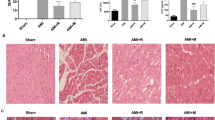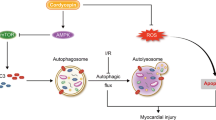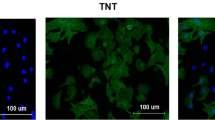Abstract
The blood flow restoration of ischemic tissues causes myocardial injury. Dexmedetomidine (Dex) protects multi-organs against ischemia/reperfusion (I/R) injury. This study investigated the protective mechanism of Dex post-treatment in myocardial I/R injury. The rat model of myocardial I/R was established. The effects of Dex post-treatment on cardiac function and autophagy flow were observed. Dex attenuated myocardial I/R injury and reduced I/R-induced autophagy in rats. Dex weakened the interactions between Beclin1 and Vps34 and Beclin1 and Atg14L, thus downregulating Vps34 kinase activity. In vitro, the cardiomyocytes subjected to oxygen glucose deprivation/reoxygenation were treated with Dex and PI3K inhibitor LY294002. LY294002 attenuated the myocardial protective effect of DEX, indicating that Dex protected against cardiac I/R by activating the PI3K/Akt pathway. In conclusion, Dex upregulated the phosphorylation of Beclin1 at S295 site by activating the PI3K/Akt pathway and reduced the interactions of Atg14L-Beclin1-Vps34 complex, thus inhibiting autophagy and protecting against myocardial I/R injury.





Similar content being viewed by others
Data Availability
The analyzed data sets generated during the study are available from the corresponding author on reasonable request.
References
Lu, L., Liu, M., Sun, R., et al. (2015). Myocardial infarction: Symptoms and treatments. Cell Biochemistry and Biophysics, 72(3), 865–867.
Frank, A., Bonney, M., Bonney, S., et al. (2012). Myocardial ischemia reperfusion injury: From basic science to clinical bedside. Seminars in Cardiothoracic and Vascular Anesthesia, 16(3), 123–132.
Nobian, A., Mohamed, A., & Spyridopoulos, I. (2019). The role of arginine vasopressin in myocardial infarction and reperfusion. Kardiologia Polska, 77(10), 908–917.
Caccioppo, A., Franchin, L., Grosso, A., et al. (2019). Ischemia reperfusion injury: Mechanisms of damage/protection and novel strategies for cardiac recovery/regeneration. International Journal of Molecular Sciences, 20(20), 5024.
Decuypere, J. P., Ceulemans, L. J., Agostinis, P., et al. (2015). Autophagy and the kidney: Implications for ischemia-reperfusion injury and therapy. American Journal of Kidney Diseases, 66(4), 699–709.
Xie, M., Morales, C. R., Lavandero, S., & Hill, J. A. (2011). Tuning flux: autophagy as a target of heart disease therapy. Current Opinion in Cardiology, 26(3), 216–222.
Li, X., Hu, X., Wang, J., et al. (2018). Inhibition of autophagy via activation of PI3K/Akt/mTOR pathway contributes to the protection of hesperidin against myocardial ischemia/reperfusion injury. International Journal of Molecular Medicine, 42(4), 1917–1924.
Aghaei, M., Motallebnezhad, M., Ghorghanlu, S., et al. (2019). Targeting autophagy in cardiac ischemia/reperfusion injury: A novel therapeutic strategy. Journal of Cellular Physiology, 234(10), 16768–16778.
Lamark, T., & Johansen, T. (2012). Aggrephagy: selective disposal of protein aggregates by macroautophagy. International Journal of Cell Biology, 2012, 736905.
Ma, B., Cao, W., Li, W., et al. (2014). Dapper1 promotes autophagy by enhancing the Beclin1-Vps34-Atg14L complex formation. Cell Research, 24(8), 912–924.
Pyo, K. E., Kim, C. R., Lee, M., et al. (2018). ULK1 O-GlcNAcylation is crucial for activating VPS34 via ATG14L during autophagy initiation. Cell Reports, 25(10), 2878–2890 e4.
Li, A., Yuen, V. M., Goulay-Dufay, S., & Kwok, P. C. (2016). Pharmacokinetics and pharmacodynamics of dexmedetomidine. Drug Development and Industrial Pharmacy, 42(12), 1917–1927.
Wang, Y., Wu, S., Yu, X., et al. (2016). Dexmedetomidine protects rat liver against ischemia-reperfusion injury partly by the alpha2A-adrenoceptor subtype and the mechanism is associated with the TLR4/NF-kappaB pathway. International Journal of Molecular Sciences, 17(7), 995.
Sun, Z., Zhao, T., Lv, S., et al. (2018). Dexmedetomidine attenuates spinal cord ischemia-reperfusion injury through both anti-inflammation and anti-apoptosis mechanisms in rabbits. Journal of Translational Medicine, 16(1), 209.
Liang, J., Zhang, X. Y., Zhen, Y. F., et al. (2019). PGK1 depletion activates Nrf2 signaling to protect human osteoblasts from dexamethasone. Cell Death & Disease, 10(12), 888.
Cheng, J., Zhu, P., Qin, H., et al. (2018). Dexmedetomidine attenuates cerebral ischemia/reperfusion injury in neonatal rats by inhibiting TLR4 signaling. The Journal of International Medical Research, 46(7), 2925–2932.
Cai, Y., Xu, H., Yan, J., et al. (2014). Molecular targets and mechanism of action of dexmedetomidine in treatment of ischemia/reperfusion injury. Molecular Medicine Reports, 9(5), 1542–1550.
Zhang, W., & Zhang, J. (2017). Dexmedetomidine preconditioning protects against lung injury induced by ischemia-reperfusion through inhibition of autophagy. Experimental and Therapeutic Medicine, 14(2), 973–980.
Zhang, X., Li, Y., Wang, Y., et al. (2020). Dexmedetomidine postconditioning suppresses myocardial ischemia/reperfusion injury by activating the SIRT1/mTOR axis. Bioscience Reports, 40(5), BSR20194030.
Yu, T., Liu, D., Gao, M., et al. (2019). Dexmedetomidine prevents septic myocardial dysfunction in rats via activation of alpha7nAChR and PI3K/Akt- mediated autophagy. Biomedicine & Pharmacotherapy, 120, 109231.
Witlin, L. T. (1988). 1987 Schwartz award. Countersuits by medical malpractice defendants against attorneys. The Journal of Legal Medicine, 9(3), 421–447.
Peng, K., Chen, W. R., Xia, F., et al. (2020). Dexmedetomidine post-treatment attenuates cardiac ischaemia/reperfusion injury by inhibiting apoptosis through HIF-1alpha signalling. Journal of Cellular and Molecular Medicine, 24(1), 850–861.
Cheng, X. Y., Gu, X. Y., Gao, Q., et al. (2016). Effects of dexmedetomidine postconditioning on myocardial ischemia and the role of the PI3K/Akt-dependent signaling pathway in reperfusion injury. Molecular Medicine Reports, 14(1), 797–803.
Cheng, X., Hu, J., Wang, Y., et al. (2018). Effects of dexmedetomidine postconditioning on myocardial ischemia/reperfusion injury in diabetic rats: role of the PI3K/Akt-dependent signaling pathway. Journal Diabetes Research, 2018, 3071959.
Bunte, S., Behmenburg, F., Majewski, N., et al. (2020). Characteristics of dexmedetomidine postconditioning in the field of myocardial ischemia-reperfusion injury. Anesthesia and Analgesia, 130(1), 90–98.
Zhu, Y., Li, S., Liu, J., et al. (2019). Role of JNK signaling pathway in dexmedetomidine post-conditioning-induced reduction of the inflammatory response and autophagy effect of focal cerebral ischemia reperfusion injury in rats. Inflammation, 42(6), 2181–2191.
Zhao, Y., Feng, X., Li, B., et al. (2020). Dexmedetomidine protects against lipopolysaccharide-induced acute kidney injury by enhancing autophagy through inhibition of the PI3K/AKT/mTOR pathway. Frontiers in Pharmacology, 11, 128.
Luo, C., Ouyang, M. W., Fang, Y. Y., et al. (2017). Dexmedetomidine protects mouse brain from ischemia-reperfusion injury via inhibiting neuronal autophagy through up-regulating HIF-1alpha. Frontiers in Cellular Neuroscience, 11, 197.
Lempiainen, J., Finckenberg, P., Mervaala, E. E., et al. (2014). Dexmedetomidine preconditioning ameliorates kidney ischemia-reperfusion injury. Pharmacology Research & Perspectives, 2(3), e00045.
Kang, R., Zeh, H. J., Lotze, M. T., & Tang, D. (2011). The Beclin 1 network regulates autophagy and apoptosis. Cell Death and Differentiation, 18(4), 571–580.
Menon, M. B., & Dhamija, S. (2018). Beclin 1 phosphorylation - At the center of autophagy regulation. Frontiers in Cell and Development Biology, 6, 137.
Wang, R. C., Wei, Y., An, Z., et al. (2012). Akt-mediated regulation of autophagy and tumorigenesis through Beclin 1 phosphorylation. Science, 338(6109), 956–959.
Boag, S. E., Andreano, E., & Spyridopoulos, I. (2017). Lymphocyte communication in myocardial ischemia/reperfusion injury. Antioxidants & Redox Signaling, 26(12), 660–675.
Mokhtari-Zaer, A., Marefati, N., Atkin, S. L., et al. (2018). The protective role of curcumin in myocardial ischemia-reperfusion injury. Journal of Cellular Physiology, 234(1), 214–222.
Sun, Y., Yi, W., Yuan, Y., et al. (2013). C1q/tumor necrosis factor-related protein-9, a novel adipocyte-derived cytokine, attenuates adverse remodeling in the ischemic mouse heart via protein kinase A activation. Circulation, 128(11 Suppl 1), S113–S120.
Wong, W. W., & Puthalakath, H. (2008). Bcl-2 family proteins: The sentinels of the mitochondrial apoptosis pathway. IUBMB Life, 60(6), 390–397.
Zhang, J., Jiang, H., Liu, D. H., & Wang, G. N. (2019). Effects of dexmedetomidine on myocardial ischemia-reperfusion injury through PI3K-Akt-mTOR signaling pathway. European Review for Medical and Pharmacological Sciences, 23(15), 6736–6743.
Shi, B., Ma, M., Zheng, Y., et al. (2019). mTOR and Beclin1: Two key autophagy-related molecules and their roles in myocardial ischemia/reperfusion injury. Journal of Cellular Physiology, 234(8), 12562–12568.
Osawa, T., Kotani, T., Kawaoka, T., et al. (2019). Atg2 mediates direct lipid transfer between membranes for autophagosome formation. Nature Structural & Molecular Biology, 26(4), 281–288.
Shan, Y., Sun, S., Yang, F., et al. (2018). Dexmedetomidine protects the developing rat brain against the neurotoxicity wrought by sevoflurane: Role of autophagy and Drp1-Bax signaling. Drug Design, Development and Therapy, 12, 3617–3624.
Tang, Y., Jia, C., He, J., et al. (2019). The application and analytical pathway of dexmedetomidine in ischemia/reperfusion injury. Journal of Analytical Methods in Chemistry, 2019, 7158142.
Noda, T., Matsunaga, K., & Yoshimori, T. (2011). Atg14L recruits PtdIns 3-kinase to the ER for autophagosome formation. Autophagy, 7(4), 438–439.
Russell, R. C., Tian, Y., Yuan, H., et al. (2013). ULK1 induces autophagy by phosphorylating Beclin-1 and activating VPS34 lipid kinase. Nature Cell Biology, 15(7), 741–750.
Backer, J. M. (2008). The regulation and function of Class III PI3Ks: novel roles for Vps34. Biochemical Journal, 410(1), 1–17.
Wang, B. J., Zheng, W. L., Feng, N. N., et al. (2018). The effects of autophagy and PI3K/AKT/m-TOR signaling pathway on the cell-cycle arrest of rats primary sertoli cells induced by zearalenone. Toxins (Basel), 10(10), 398.
Sun, Y., Jiang, C., Jiang, J., & Qiu, L. (2017). Dexmedetomidine protects mice against myocardium ischaemic/reperfusion injury by activating an AMPK/PI3K/Akt/eNOS pathway. Clinical and Experimental Pharmacology & Physiology, 44(9), 946–953.
Shen, M., Wang, S., Wen, X., et al. (2017). Dexmedetomidine exerts neuroprotective effect via the activation of the PI3K/Akt/mTOR signaling pathway in rats with traumatic brain injury. Biomedicine & Pharmacotherapy, 95, 885–893.
Author information
Authors and Affiliations
Contributions
Conceptualization: YL and MQ; validation, research, resources, data reviewing, and writing: FX, HL, and DC; review and editing: NX and WZ. All authors read and approved the final manuscript.
Corresponding authors
Ethics declarations
Ethics Approval and Consent to Participate
This study got the permission of the Ethical Committee of the First Affiliated Hospital of Zhengzhou University. All the animal experiments were implemented on the guide for the care and use of laboratory animals.
Patient Consent for Publication
Not applicable.
Competing Interests
The authors declare no competing interests.
Additional information
Associate Editor Nicola Smart oversaw the review of this article
Publisher’s Note
Springer Nature remains neutral with regard to jurisdictional claims in published maps and institutional affiliations.
Rights and permissions
About this article
Cite this article
Li, Y., Qu, M., Xing, F. et al. The Protective Mechanism of Dexmedetomidine in Regulating Atg14L-Beclin1-Vps34 Complex Against Myocardial Ischemia-Reperfusion Injury. J. of Cardiovasc. Trans. Res. 14, 1063–1074 (2021). https://doi.org/10.1007/s12265-021-10125-9
Received:
Accepted:
Published:
Issue Date:
DOI: https://doi.org/10.1007/s12265-021-10125-9




